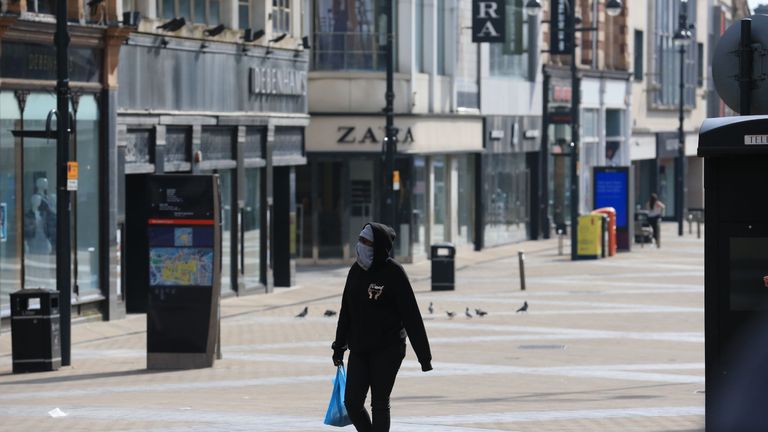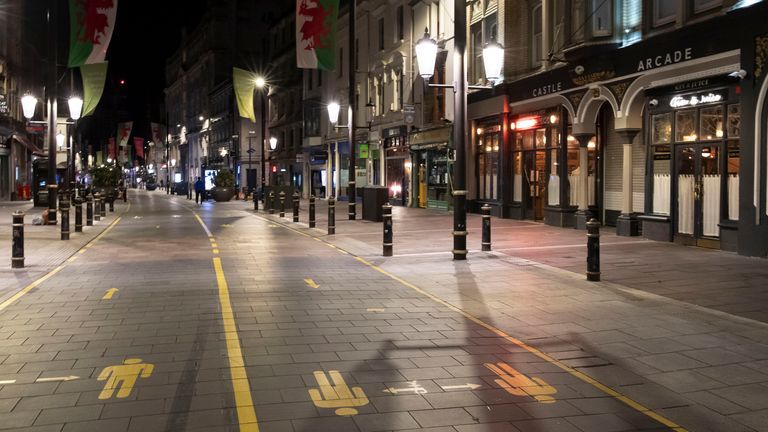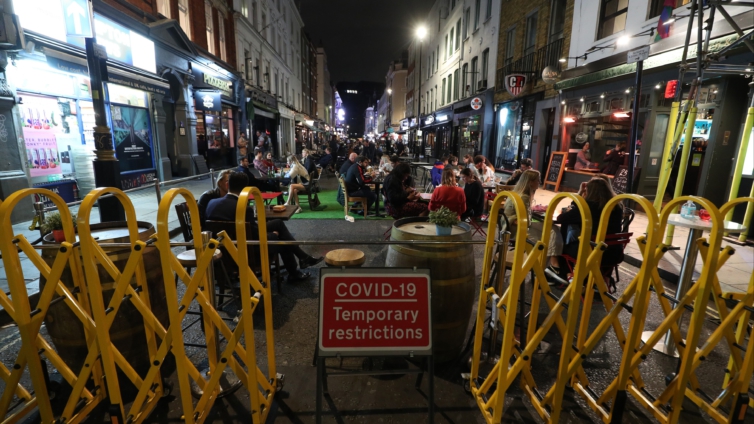London appears set to be added to the national coronavirus watchlist, while Leeds, Cardiff and Swansea face new restrictions.
Leeds is likely to face new restrictions from midnight tonight, including a ban on households mixing, its city council leader has said.
Cardiff and Swansea areas will go into local lockdown from 6 pm on Sunday, the Welsh government has announced.
The developments from Leeds and Wales came shortly after London Councils, which represents the capital's 32 boroughs and the City of London, revealed the city was being made an "area of concern".

While no additional measures being taken in London at the moment, testing capacity is being boosted to closely monitor the spread of the coronavirus.
London Councils said: "It is a stark reminder that now is time for all Londoners to pull together and take action to keep themselves, their families and their communities safe, and to ensure that London's economy is protected."
The mayor of London, Sadiq Khan, said: "London is at a very worrying tipping point right now."
Warned that any delays to upping testing will cost lives, the Labour politician added: "It's vital that testing capacity is increased immediately in London and focused in the areas it is needed most.
London has been put on the watch list with a formal announcement about lockdown expected later today.
What an absolute joke, ridiculous.
7 day average of deaths is less than 3.https://t.co/Q0LCkV85YU pic.twitter.com/s6FkHMsTze— Ben (@Brixton_Ben26) September 25, 2020
"Any delay will mean letting the city down and will cost lives."
London Councils added: "It is welcome that the city's testing capacity is boosted so that Londoners have timely access to Covid-19 tests and the government must ensure that this is sustained from now on."
The statements from London Councils and Mr Khan come less than a week after modelling suggested the capital was only two or three days behind virus hotspots in the North West and North East.
A good turn out in London today for the anti-lockdown protest, the government know we know they are lying and they don't care.pic.twitter.com/O11hA8AuGZ
— Darren of Plymouth 🇬🇧 (@DarrenPlymouth) September 19, 2020
Londoners have been urged to abide by the new restrictions set out by Boris Johnson at the start of the week - including working from home where possible and keeping to the rule of six.
Prior to the prime minister's announcement, there was an ongoing debate on whether added measures should be introduced to address rising Covid-19 rates in the city.
A spokesman for Mr Khan said the situation was "clearly worsening" and tougher restrictions were needed to "stop coronavirus spiralling out of control again".
He met with London Councils before calling on Mr Johnson to introduce curbs to slow the spread earlier this week.
Speaking on Friday, the mayor pointed to a lack of testing capacity in the capital as the reason why it had become an area of concern.
NEW: London has been added to the Government’s COVID-19 watchlist as an area of concern.
— Sadiq Khan (@SadiqKhan) September 25, 2020
The Government need to urgently increase testing availability in the capital - and Londoners must act with caution and follow public health guidelines. https://t.co/Z5nfnHCxYR pic.twitter.com/JjFPUJorUM
Mr Khan said: "The near-collapse of test and trace and the resurgence of the virus means new measures to slow its spread were absolutely necessary.
"Testing capacity was diverted away from London in the last two weeks to other national hot spots and weekly testing numbers are now down 43% in the capital since mid-August.
"The lack of testing capacity is totally unacceptable and it is why London has been added to the government's coronavirus watchlist as an area of concern."

In Leeds, city council leader Judith Blake has said she expected the city will soon be made an "area of intervention", meaning "more household restrictions along the lines of those already in force across three of the West Yorkshire districts in Bradford, Kirkless and Calderdale".
She told reporters: "We expect them to come in from midnight."
The addition of Leeds' 793,000 population would take the number of people living under local restrictions to more than 16.2 million across the UK.
Tom Riordan, chief executive of Leeds City Council, said: "What we are trying to do is give a simple message - you shouldn't really mix with other households."
Please download the NHS Covid-19 app. It will make a real difference if enough of us use it. Privacy issues dealt with as you control data. Easy check in to venues, test ordering & tracing who you’ve been in contact with if needed. All #Leeds venues will be using NHS QR codes. pic.twitter.com/rjkpZL30Rm
— Tom Riordan (@tomriordan) September 24, 2020
In Cardiff and Swansea, people will not be able to enter or leave the areas without a reasonable excuse.
They will not be able to meet indoors with anyone they do not live with, with extended households suspended.
People must work from home when possible, health minister Vaughan Gething told a press conference in Cardiff.
He also urged people not to have a "big blowout" over the weekend before the restrictions come into force, saying: "Introducing restrictions in any parts of Wales is always an incredibly difficult decision for us to make.
"Having to introduce these restrictions in our biggest cities - including our capital - is another sombre milestone in a difficult year."
BREAKING: Cardiff and Swansea will go into local lockdown from 6pm on Sunday, while the town of Llanelli will face the same restrictions from 6pm on Saturday, the Welsh government has confirmed.
— SkyNews (@SkyNews) September 25, 2020
More: https://t.co/TrUF8iKvwZ pic.twitter.com/2BJP5DbYiK
The town of Llanelli will also go into local lockdown on Saturday at 6 pm, with the transmission of the virus said to have become "concentrated" there.
On Thursday, there were 25 new cases in Carmarthenshire, 39 in Cardiff and 41 in Swansea.
The latest weekly data from the Office for National Statistics (ONS) estimates that Wales' infections overall have risen seven-fold, going from 1,500 to 10,800 - and equating to one in 300 people.
More than 103,000 people in England are estimated to have had coronavirus in the week ending 19 September, according to the data.
The rate of transmission across the UK is now thought to be between 1.2 and 1.5 - another rise on last week.
Latest Stories
-
Asantehene receives 28 looted artefacts
42 mins -
CAF WCL 2024: Ghana’s Thelma Baffour wins title with TP Mazembe
2 hours -
Benjamin Boakye slams politicisation of energy sector issues and ECG’s inefficiencies
2 hours -
Erastus Asare Donkor and Dr Neta Parsram win big at 10th Mining Industry Awards
2 hours -
Government is “suppressing information” about power sector challenges – IES Director
2 hours -
Majority of our debts caused by forex shortfall – ECG Boss
2 hours -
Pan-African Savings and Loans supports Ghana Blind Union with boreholes
3 hours -
Bole-Bamboi MP Yussif Sulemana donates to artisans and Bole SHS
3 hours -
Top up your credit to avoid potential disruption – ECG to Nuri meter customers
3 hours -
Dutch & Co wins 2024 Entrepreneur of the Year Award
3 hours -
We’ll cut down imports and boost consumption of local rice and other products – Mahama
6 hours -
Prof Opoku-Agyemang donates to Tamale orphanage to mark her birthday
7 hours -
Don’t call re-painted old schools brand new infrastructure – Prof Opoku-Agyemang tells gov’t
8 hours -
Sunon Asogli plant will be back on stream in a few weeks – ECG
8 hours -
ECOWAS deploys observers for Dec. 7 election
8 hours

